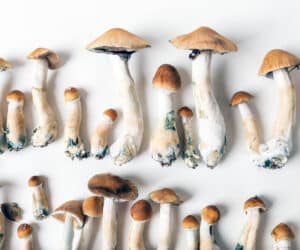Cannabis, Magic Mushrooms, Psilocybin
Are Psychedelic and Functional Mushrooms the Same?
As mushrooms gain attention for their powerful health benefits, there’s growing curiosity—and confusion—about the different types of mushrooms on the market. Specifically, many people wonder:
Are psychedelic mushrooms and functional mushrooms the same thing?
The short answer is: No. Psychedelic mushrooms and functional mushrooms are not the same. They come from different species, have different chemical compositions, and are used for entirely different purposes.
Let’s break down the key differences, how each type works, and what you need to know before adding mushrooms to your wellness routine.
🍄 What Are Psychedelic Mushrooms?
Psychedelic mushrooms, often called “magic mushrooms,” are fungi that contain psilocybin, a naturally occurring psychoactive compound. When ingested, psilocybin converts into psilocin, which alters perception, mood, and cognition. These mushrooms have been used for centuries in Indigenous rituals and are now being studied for their therapeutic potential.
Common psychedelic mushroom species include:
- Psilocybe cubensis
- Psilocybe semilanceata
- Psilocybe azurescens
Effects of psychedelic mushrooms:
- Visual and auditory hallucinations
- Altered sense of time and space
- Deep introspection or spiritual experiences
- Emotional breakthroughs or releases
Current use in modern medicine:
Research institutions are exploring psilocybin-assisted therapy for depression, PTSD, addiction, and anxiety, with promising results. However, these mushrooms are still classified as controlled substances in many countries.
🍄 What Are Functional Mushrooms?
Functional mushrooms are non-psychoactive fungi used to support physical and mental health. Unlike their psychedelic cousins, functional mushrooms don’t alter perception or consciousness. Instead, they contain adaptogenic and immune-boosting compounds that help the body handle stress, improve cognition, and support overall wellness.
Popular functional mushrooms include:
- Lion’s Mane – for memory, focus, and nerve regeneration
- Reishi – for relaxation, stress support, and sleep
- Cordyceps – for energy, endurance, and oxygen use
- Chaga – for antioxidant and immune support
- Turkey Tail – for gut health and immune modulation
These mushrooms are commonly consumed as teas, powders, capsules, or extracts, and are legal in most parts of the world.
🔬 Key Differences Between Psychedelic and Functional Mushrooms
| Feature | Psychedelic Mushrooms | Functional Mushrooms |
| Main compound | Psilocybin | Beta-glucans, polysaccharides, triterpenes, erinacines, etc. |
| Legal status | Often restricted or illegal | Legal and widely available |
| Effects | Mind-altering, hallucinogenic | Supportive, non-psychoactive |
| Purpose | Therapy, spirituality, consciousness exploration | Stress support, immune health, cognition, energy |
| Use frequency | Occasionally in guided sessions | Daily or as part of a wellness routine |
| Side effects | Possible anxiety, nausea, paranoia (in high doses) | Generally well-tolerated, mild digestive effects in some |
🧠 Do They Ever Overlap?
While the two types of mushrooms are distinct, they both share a rich history of medicinal use and a growing body of scientific interest. In fact, both psychedelic and functional mushrooms:
- Interact with the nervous system and brain
- Offer neuroprotective and anti-inflammatory benefits
- May influence mood and mental well-being (though in very different ways)
Lion’s Mane, for example, may enhance neuroplasticity over time, while psilocybin mushrooms can induce rapid emotional breakthroughs in controlled therapeutic settings.
⚠️ Important Considerations
1. Legality and Access
- Functional mushrooms are available over-the-counter in most countries.
- Psychedelic mushrooms are often regulated or illegal, although some regions (like Oregon or parts of Canada and Europe) are beginning to decriminalize or allow their use in therapy.
2. Use Case
- If you’re looking for daily cognitive support, immune strength, or stress relief, functional mushrooms are the way to go.
- If you’re interested in emotional healing or consciousness expansion, psychedelic mushrooms may be considered—but always under professional guidance and legal conditions.
3. Safety
- Functional mushrooms are non-addictive, well-tolerated, and safe for most people.
- Psychedelic mushrooms require careful set and setting to avoid negative psychological experiences.
🌱 Final Thoughts
While psychedelic and functional mushrooms both belong to the incredible kingdom of fungi, they serve very different purposes in human health. One is a tool for deep inner exploration and healing, often used in guided therapeutic contexts. The other is a daily ally for building resilience, boosting brain health, and supporting immunity.
Understanding the differences helps you make informed choices and avoid confusion—especially when shopping for mushroom supplements or reading wellness advice.
Whether you’re sipping Lion’s Mane tea for focus or exploring the future of psilocybin-assisted therapy, mushrooms are proving to be one of nature’s most powerful healers—just in very different ways.

